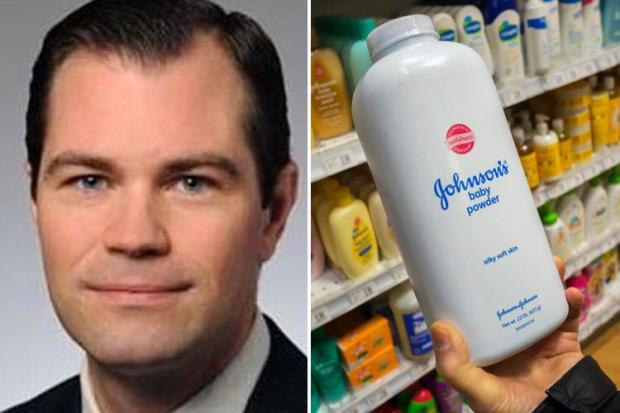Banker wins £21million from Johnson & Johnson after jury backs claim baby powder gave him CANCER

A BANKER has been awarded more than £21million from Johnson & Johnson over claims its baby powder gave him cancer.
Stephen Lanzo, 46, said his lifelong use of talc contributed to his mesothelioma diagnosis in 2016.
He sued the cosmetics giant and its supplier insisting they knew the powder could contain cancer-causing asbestos — but failed to warn the public.
On Friday a jury agreed with Lanzo, from New Jersey in the US, awarding him $30million. His wife Kendra was awarded $7million — worth £4.9million.
Further punitive damages could be awarded next week if the judge rules J&J was guilty of unethical or negligent practices.
The ruling could leave the company open to further bombshell payouts. It is currently facing more than 6,600 talc-related lawsuits.
J&J will be liable for 70 per cent of the damages with talc supplier Imerys Talc due to pay the rest — although both will likely challenge the ruling.
Talcum powder is made from talc mined from deposits often found near sites riddled with asbestos — a flame-retardant material that is highly carcinogenic.
Studies showed that there can be a risk of cross-contamination of the two materials during the production process — although it is much less likely today.
Mr Lanzo's lawyers argued he may have been inhaling asbestos when he used the baby powder product.
What is mesothelioma? Cancer linked to asbestos
Mesothelioma is a type of cancer that develops in the lining that covers the outer surface of some of the body's organs.
It is usually linked to asbestos exposure.
Mesothelioma mainly affects the lining of the lungs (pleural mesothelioma), although it can also affect the lining of the tummy (peritoneal mesothelioma), heart or testicles.
More than 2,600 people are diagnosed with the condition each year in the UK.
Most cases are diagnosed in people aged 60-80 and men are affected more commonly than women.
Unfortunately it is rarely possible to cure mesothelioma, although treatment can help control the symptoms.
Source: NHS Choices
They also claimed the company was deliberately holding back information about potential health risks since as early as the 1960s.
An internal memo from J&J revealed concerns from a scientist over the potential asbestos contamination in its baby powder.
Johnson & Johnson has strongly denied the claim and insists it carries out vigorous testing to make sure its products are uncontaminated.
Carol Goodrich, a spokeswoman for Johnson & Johnson, told : "While we are disappointed with this decision, the jury has further deliberations to conduct in this trial and we will reserve additional comment until the case is fully completed".
MOST READ IN NEWS
Imerys Talc spokeswoman Gwen Myers said: "Our hearts go out to those affected by all forms of cancer.
"We are disappointed by the jury's decision, but we remain confident that talc did not cause Mr Lanzo's cancer."
In August last year a woman was awarded £323million in California after claiming baby powder caused her ovarian cancer. Her award was later scrapped on appeal.
The International Agency for Research on Cancer has classified genital talc as a possible cancer-causing agent.
But Cancer Research UK has criticised some studies claiming a link between talcum powder use and cancer.
It said: "Even if there is a risk it is likely to be fairly small".
The Sun Online has reached out to Johnson & Johnson for comment.
We pay for your stories! Do you have a story for The Sun Online news team? Email us at [email protected] or call 0207 782 4368. You can WhatsApp us on 07810 791 502. We pay for videos too. Click here to upload yours.








